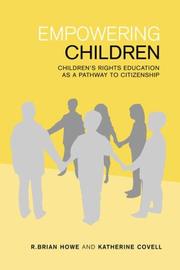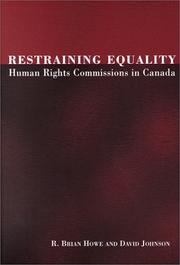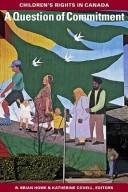| Listing 1 - 6 of 6 |
Sort by
|

ISBN: 0802038573 080208012X 9786612023651 0802095232 1442687975 1282023659 1442674385 0802089437 0802090478 9781442674387 9781442687974 9781282023659 9780802038579 9780802095237 9780802095237 1442692138 9781442692138 Year: 2005 Publisher: Toronto, [Ontario] ; Buffalo, [New York] ; London, [England] : University of Toronto Press,
Abstract | Keywords | Export | Availability | Bookmark
 Loading...
Loading...Choose an application
- Reference Manager
- EndNote
- RefWorks (Direct export to RefWorks)
"In Empowering Children, R. Brian Howe and Katherine Covell assert that educating children about their basic rights is a necessary means not only of fulfilling a country's legal obligations, but also of advancing education about democratic principles and the practice of citizenship. The authors contend that children's rights education empowers children as persons and as rights-respecting citizens in democratic societies. Such education has a 'contagion effect' that brings about a general social knowledge on human rights and social responsibility." "Although there remain obstacles to the implementation of children's rights in many countries, Howe and Covell argue that reforming schools and enhancing teacher education are absolutely essential to the creation of a new culture of respect toward children as citizens. Their thorough and passionate work marks a significant advance in the field."--Jacket
Human rights
---
Age group sociology
---
Social policy and particular groups
---
094.1 <71>
---
094.1 <71> Oude drukken: bibliografie--

ISBN: 1282037285 9786612037283 1442679271 9781442679276 0802044824 9780802044822 0802082637 9780802082633 9781282037281 6612037288 Year: 2000 Publisher: Toronto, [Ontario] ; Buffalo, [New York] ; London, [England] : University of Toronto Press,
Abstract | Keywords | Export | Availability | Bookmark
 Loading...
Loading...Choose an application
- Reference Manager
- EndNote
- RefWorks (Direct export to RefWorks)
"Restraining Equality addresses the contemporary financial, social, legal, and policy pressures currently experienced by human rights commissions across Canada. Through a combination of public policy analysis, historical research, and legal analysis, R. Brian Howe and David Johnson trace the evolution of human rights policy within this country and explore the stresses placed on human rights commissions resulting from greater fiscal restraints and society's rising expectations for equality rights over the past two decades."--Jacket
Civil rights --- Human rights --- Administrative agencies --- Canada --- Administration.
Book
ISBN: 1281892602 9786611892609 1846428475 9781846428470 9781281892607 9781843106982 1843106981 6611892605 Year: 2009 Publisher: London ; Philadelphia : Jessica Kingsley Publishers,
Abstract | Keywords | Export | Availability | Bookmark
 Loading...
Loading...Choose an application
- Reference Manager
- EndNote
- RefWorks (Direct export to RefWorks)
This book examines the risk factors surrounding children at risk of experiencing and perpetrating violence, and looks at the positive role that children's rights can play in their protection. The authors propose that violence in childhood is not spontaneous: that children are raised to become violent in poorly functioning families.
Children's rights. --- Violence in children. --- Family violence. --- Child psychopathology --- Children and violence --- Domestic violence --- Household violence --- Interparental violence --- Intrafamily violence --- Violence --- Child rights --- Children --- Children's human rights --- Children's rights --- Rights of children --- Rights of the child --- Human rights --- Civil rights --- Law and legislation --- Legal status, laws, etc.

ISBN: 1554587085 1280908076 9786610908073 1554581001 1429480319 9781429480314 9781280908071 9781554581009 9781554587087 6610908079 9781554580033 155458003X Year: 2007 Publisher: Waterloo, Ont. : Wilfrid Laurier University Press,
Abstract | Keywords | Export | Availability | Bookmark
 Loading...
Loading...Choose an application
- Reference Manager
- EndNote
- RefWorks (Direct export to RefWorks)
In 1991, the Government of Canada ratified the United Nations Convention on the Rights of the Child, requiring governments at all levels to ensure that Canadian laws and practices safeguard the rights of children. A Question of Commitment: Children's Rights in Canada is the first book to assess the extent to which Canada has fulfilled this commitment. The editors, R. Brian Howe and Katherine Covell, contend that Canada has wavered in its commitment to the rights of children and is ambivalent in the political culture about the principle of children's rights. A Question of
Jeunesse --- Enfants --- Child welfare --- Children --- Children's rights --- Protection, assistance, etc. --- Politique gouvernementale --- Droits --- Government policy --- Convention relative aux droits de l'enfant --- Convention on the Rights of the Child --- Children's Rights --- Child Welfare --- Law --- Political Science
Book
ISBN: 1280925485 9786610925483 0889208565 9781280925481 9780889208568 Year: 2001 Publisher: Waterloo, Ont. : Wilfrid Laurier University Press,
Abstract | Keywords | Export | Availability | Bookmark
 Loading...
Loading...Choose an application
- Reference Manager
- EndNote
- RefWorks (Direct export to RefWorks)
Canada signed the United Nations Convention on the Rights of the Child over a decade ago, yet there is still a lack of awareness about and provision for children's rights. What are Canada's obligations to children? How has Canada fallen short? Why is it so important to the future of Canadian society that children's rights be met? Prompted by the gap between the promise of children's rights and the reality of their continuing denial, Katherine Covell and R. Brian Howe call for changes to existing laws, policies and practices. Using the United Nations Convention on the Righ
Children's rights --- Children --- Child welfare --- Government policy --- Convention on the Rights of the Child
Book
ISBN: 1771124059 1771124067 1771124075 Year: 2020 Publisher: Waterloo, Ontario : Wilfrid Laurier University Press,
Abstract | Keywords | Export | Availability | Bookmark
 Loading...
Loading...Choose an application
- Reference Manager
- EndNote
- RefWorks (Direct export to RefWorks)
With the adoption of the United Nations Convention on the Rights of the Child (1989), commentators began to situate the evolution of the status of children within the context of the "property to persons" trajectory that other human rights stories had followed. In the first edition of A Question of Commitment, editors R. Brian Howe and Katherine Covell provided a template of analysis for understanding this evolution. They identified three overlapping stages of development as children transitioned from being regarded as objects to subjects in their own right: social laissez-faire, paternalistic protection, and children's rights. In the social laissez-faire stage, children are regarded as objects, and largely as the property of parents. In the paternalistic protection stage, children are seen as vulnerable and in need of protection. The children's rights stage lays emphasis on children as rights-bearers, as individuals in their own right with entitlements. In this second edition, new essays assess the extent to which children's rights have been incorporated into their respective areas of policy and law. The authors draw conclusions about what the situation reveals about the status of children in Canada. Overall, many challenges remain on the pathway to full recognition and citizenship.
Children's rights --- Children --- Government policy --- Convention on the Rights of the Child --- . --- Child Participation. --- Children and Citizenship. --- Children and Public Policy. --- Children and Social Policy. --- Children and the Law. --- Children as Persons. --- Children as Property. --- Children's Rights. --- Future of Childhood. --- Human Rights. --- International Law. --- Protecting Children. --- The UN Convention on the Rights of the Child. --- The Welfare of Children. --- Views of Children.
| Listing 1 - 6 of 6 |
Sort by
|

 Search
Search Feedback
Feedback About UniCat
About UniCat  Help
Help News
News